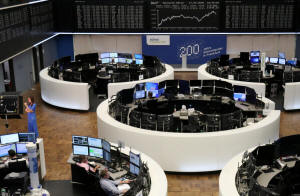Shares slide, dollar up as hopes of economic recovery fade
 Send a link to a friend
Send a link to a friend
 [September 24, 2020]
By Simon Jessop [September 24, 2020]
By Simon Jessop
LONDON (Reuters) - Global shares fell and
the dollar hit a two-month high on Thursday on investor concern about
another economic hit from the coronavirus pandemic, ahead of key U.S.
jobless data and comments from the head of the Federal Reserve.
After a summer lull in much of Europe, the infection rate has begun to
rise sharply, with a number of countries including Britain introducing
tougher rules to help limit the spread of the virus.
Fears that a market rebound in recent months had gone too far held
stocks back, although positive German and French business sentiment data
helped pare European losses slightly as did U.S. stock futures pointing
to a flat open.
The MSCI World <.MIWD00000PUS> index was down 0.5% at 1018 GMT, its
fifth day in the red out of the last six and hovering near a two-month
low. A broad gauge of Europe's top shares, the STOXX Europe 600 <.STOXX>,
was down 0.4%.
S&P 500 futures <ESc1> were flat nearing midday, holding steady after
falls in the prior session after economic warnings from U.S. Federal
Reserve officials.

That had, in turn, helped tee up weakness overnight in Asia with Asia
Pacific shares outside Japan <.MIAPJ0000PUS> down 1.99% to chalk up
their worst day in two months.
"Optimism on the recovery, optimism on the virus, and bets on stimulus
were keeping markets well bid, and on all three of these issues, there
has been a degree of disappointment this month," said John Velis, an FX
and macro strategist at BNY Mellon.
High-grade euro zone government bond yields fell across the board on an
expectation that stimulus measures would be maintained, with the German
10-year down 2.2 basis points. The U.S. 10-year was dowm 0.5 basis
points.
Despite markets betting on more U.S. fiscal stimulus, political
stalemate in Washington continues to frustrate efforts to prop up the
world's biggest economy, beset by one of the worst COVID-19 death rates
globally.
"A U.S. fiscal deal was baked into markets and now what you are seeing
is that the probability of a deal going through has simply reversed,"
said Justin Onuekwusi, a London-based portfolio manager at Legal and
General Investment Management.
"We have heard this week how important a fiscal deal is to the Federal
Reserve but from a political standpoint, focus has moved more towards
the election and Supreme Court deliberations rather than the economy,"
he added.
[to top of second column]
|

The German share price index DAX graph is pictured at the stock
exchange in Frankfurt, Germany, September 17, 2020. REUTERS/Staff

Flows into the dollar <=USD> helped it rise for a fourth straight
day. Although gains had been pared slightly from the open, it
remains on track to record its longest streak of daily gains since
June.
The slight perk-up in sentiment helped Brent crude futures <LCOc1>
recover early losses to trade flat at $41.80 a barrel although gold
<XAU=> remained lower, down 0.6% and on course for a fourth day of
losses that total nearly 7%.
The euro <EUR=> was flat at $1.1658.
With central bankers in focus globally, U.S. Federal Reserve Chair
Jerome Powell will be closely watched later in the day when he
testifies before the Senate Banking Committee, while other Fed
officials are scheduled to speak at other events during the day.
Investors are also waiting for weekly data due later on Thursday,
which is expected to show U.S. jobless claims fell slightly but
remained elevated, indicating the world's largest economy is far
from recovering.
A similar picture was visible in Europe, where the European Central
Bank's latest Economic Bulletin said unemployment would continue to
rise in the euro zone, with little growth in demand seen for
consumer goods.
Elsewhere among regional ratesetters, the Swiss National Bank
maintained its easy monetary policy, but turned less gloomy on the
impact of the pandemic. In Britain, meanwhile, the finance minister
launched a new jobs support scheme.
In emerging markets, Turkey surprised markets with a hike in its
policy rate by 200 basis points to 10.25%, sending the lira and
bonds higher. Mexico is also set to decide on monetary policy later
on Thursday.

MSCI's Emerging Markets Index <.MSCIEF> was down 1.8%.
(Additional reporting by Imani Moise in New York, Marc Jones, Saikat
Chatterjee and Sujata Rao in London; Editing by John Stonestreet,
Andrew Heavens and Chizu Nomiyama)
[© 2020 Thomson Reuters. All rights
reserved.] Copyright 2020 Reuters. All rights reserved. This material may not be published,
broadcast, rewritten or redistributed.
Thompson Reuters is solely responsible for this content. |